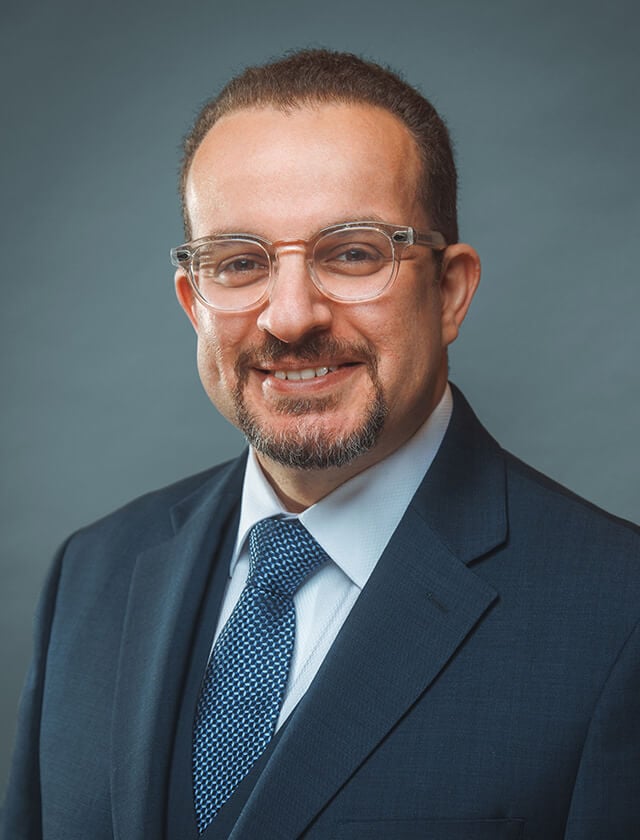-banner%20(1).jpg?width=1156&height=650&name=Occipital%20Neuralgia%20(T2)-banner%20(1).jpg)
Occipital Neuralgia Treatment in Florida: Expert Surgery for Long-Term Relief
-banner%20(1).jpg?width=1156&height=650&name=Occipital%20Neuralgia%20(T2)-banner%20(1).jpg)
What Causes Occipital Neuralgia?
Occipital neuralgia is a chronic pain condition caused by compression or irritation of the occipital nerves—located at the base of the skull. Unlike migraines or tension headaches, the pain is sharp, electric, and positional, often triggered by movement, touch, or simply resting your head. Because the symptoms can mimic other headache types, occipital neuralgia is frequently misdiagnosed—leading many patients down a cycle of ineffective migraine treatments.
When nerve compression is the true cause, surgical decompression can relieve the pressure at its source—delivering long-term relief where symptom-focused treatments fall short.
Watch The Video to Learn More
Check Your Symptoms: Are You Experiencing Any of the Following?
- Sharp, stabbing, or electric-shock pain at the base of your skull.
- Headaches that radiate to the scalp, behind the eyes, or into the temples.
- Pain that worsens with neck movement, touch, or lying on a pillow.
- Scalp tenderness or sensitivity when brushing hair or wearing hats.
- A “shockwave” sensation triggered by pressure near the back of your head.
- Headache relief after nerve blocks or local anesthetic injections.
If you said yes to any of the above, you may be a candidate for nerve decompression surgery.
What is Decompression Surgery for Occipital Neuralgia?
During surgery, your specialist carefully identifies the affected nerve, releases it from surrounding tissue, and addresses all potential points of compression. The goal is to restore normal nerve function, reduce hypersensitivity, and interrupt the pain cycle at its source. This outpatient procedure is performed under general anesthesia, has a low complication rate, and often provides lasting relief within weeks.
See How We’re Changing Lives, One Patient at a Time
What Are the Benefits of Nerve Decompression Surgery?
Am I a Candidate for Surgery?
Surgical decompression isn’t for everyone—but it can be life-changing for patients whose pain is traced back to compressed occipital nerves. If your symptoms match the nerve pain pattern and you’ve already tried other treatments, it’s time for a surgical evaluation.
You may qualify if you:
- Feel electric or stabbing pain at the base of your skull
- Notice sensitivity when brushing your hair or wearing hats
- Struggle with chronic headaches that worsen with movement or touch
- Had temporary relief from an occipital nerve block
- Have a diagnosis that doesn’t explain your pain—or no diagnosis at all
.jpg?width=614&height=385&name=Am%20I%20a%20Candidate%20for%20Surgery%20(1).jpg)
.jpg?width=614&height=385&name=Why%20is%20Occipital%20Neuralgia%20Often%20Misdiagnosed%20as%20Chronic%20Headaches%20(1).jpg)
Why is Occipital Neuralgia Often Misdiagnosed as Chronic Headaches?
Occipital neuralgia is frequently mistaken for migraines or tension headaches because the symptoms—head pain, scalp sensitivity, and pressure—overlap significantly. But unlike those conditions, occipital neuralgia stems from nerve compression, not vascular or muscular dysfunction. Standard imaging often fails to detect the issue, and medications typically offer only short-term relief, if any. As a result, many patients spend years cycling through ineffective headache treatments without addressing the actual source of their pain. At The Institute of Florida, our specialists are trained to identify nerve-based causes of chronic head pain and provide targeted solutions—including surgical decompression—when conventional care falls short.
.jpg?width=614&height=385&name=Why%20is%20Occipital%20Neuralgia%20Often%20Misdiagnosed%20as%20Chronic%20Headaches%20(1).jpg)
Considering Nerve Decompression Surgery? What to Expect:
Precision Diagnostics
We use a combination of MRI imaging, targeted palpation, and diagnostic occipital nerve blocks to confirm the exact nerve involved. This comprehensive approach ensures that only true nerve compression cases move forward to surgery—so patients avoid unnecessary procedures and receive the most appropriate care from the start.Tailored Surgery
Our nerve surgeons perform decompression using high-powered surgical magnification and intraoperative nerve monitoring to protect surrounding tissue and ensure accuracy at every step. Using microsurgical dissection tools, we relieve pressure on the occipital nerve at known entrapment sites—such as the semispinalis capitis (a deep neck muscle where the nerve often gets trapped) and the trapezial tunnel (a tight passage formed by the trapezius muscle and surrounding tissue). Every procedure is customized to your anatomy and compression pattern, with a focus on lasting relief.Rapid Recovery
Occipital nerve decompression is performed as an outpatient procedure. Most patients return home the same day and resume light activity within a week. Compared to traditional headache surgeries, this approach allows for faster healing, minimal downtime, and fewer complications.Why Trust The Institute of Florida?
.jpg?width=830&height=365&name=Why%20Trust%20The%20Institute%20of%20Florida%20(1).jpg)
One of the Few U.S. Centers Specializing in Surgical Treatment for Occipital Neuralgia
The Institute of Florida is a national referral destination for patients with chronic head and neck pain caused by occipital nerve compression. Our team performs one of the highest volumes of occipital nerve decompressions in the country—bringing unmatched surgical depth and precision diagnostics to every case.
Surgical Expertise That Begins With the Nerve
Unlike general headache or pain clinics, we focus on the source. Our surgeons are trained in advanced peripheral nerve techniques and have performed hundreds of nerve decompression procedures, making us one of the most experienced teams in the U.S. for nerve-driven pain.
Technology Designed for Precision Nerve Surgery
We use high-magnification optics, real-time intraoperative nerve monitoring, and microsurgical instruments to isolate the problem with accuracy—preserving surrounding tissue and maximizing relief.
85% of Patients Report Lasting Relief
We don’t just track procedures—we track outcomes. Across our surgical program, 85% of patients with occipital neuralgia report long-term pain reduction, improved quality of life, and decreased reliance on medication.
Meet Florida’s Top
Nerve Surgery Experts

Plastic & Reconstructive Surgeon
Board Certified in Plastic Surgery
Still in Pain? Let’s Fix That.
If you’re living with unresolved headaches—or treating a patient who is—our team is here to help. With advanced surgical expertise and proven results, we offer real hope for lasting relief.
Now seeing patients in Ft. Lauderdale and Boynton Beach.
Frequently Asked Questions
Occipital neuralgia can be extremely disruptive—even debilitating—when left untreated. While not life-threatening, the nerve pain can interfere with sleep, mobility, work, and emotional health. It often worsens over time if the compression isn't addressed.
Occipital nerve decompression is considered a low-risk, outpatient procedure when performed by a qualified nerve surgeon. We use advanced microsurgical techniques to minimize risk and shorten recovery time.
Like any surgery, there are potential risks, including infection, bleeding, or numbness at the surgical site. Serious complications are rare. Our use of real-time nerve monitoring helps reduce the chance of nerve injury during the procedure.
Most incisions are small and placed discreetly along the natural hairline. Scarring is typically minimal and fades with time—especially with proper post-op care.
Most patients experience lasting relief—with 80–85% reporting a 50% or greater reduction in pain. While some may have mild symptoms return over time, recurrence is uncommon when the nerve compression is fully released.






.webp)


